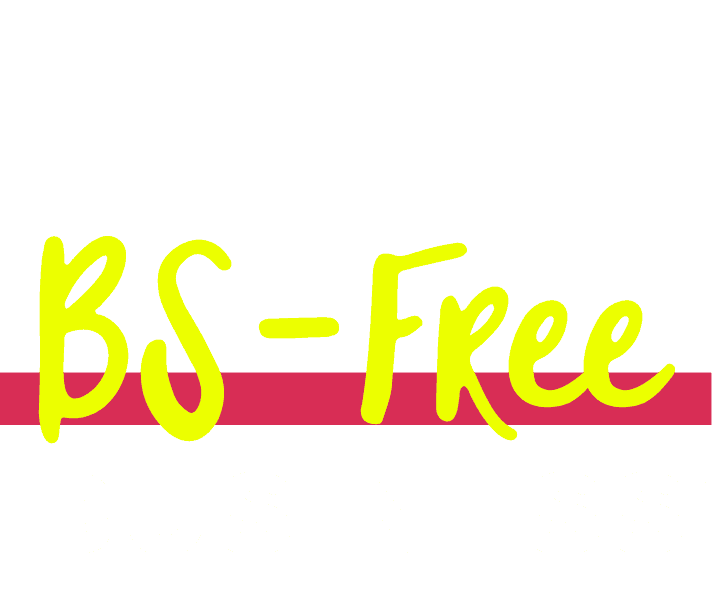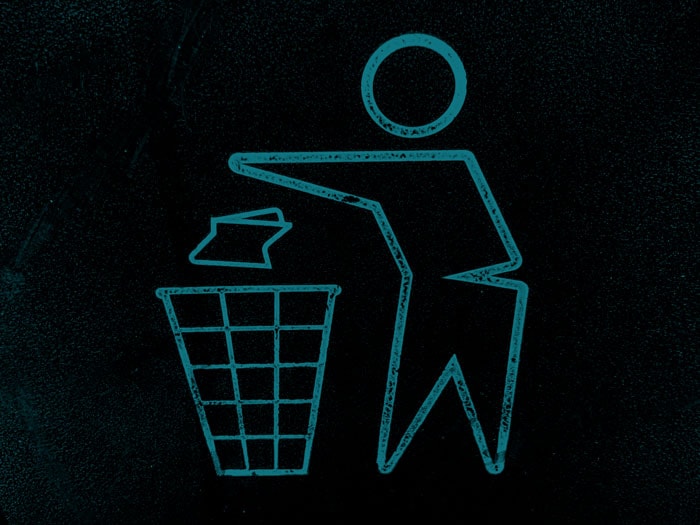2022:
The Year of the

By Maggie Patterson
All opinions in this post are my opinions and mine alone.

Table of Contents
The State of Ethical Business in 2021
Our Communities and Clients Expect More from Us
Ditching the Prescriptive, Privilege Playbook of Online Business
My Challenge to You: Run a BS-Free Business
The Cycle of Conspicuous Consumption
2022 is here, and a new year brings with it an opportunity for each of us to look at how we run our businesses and do things a little differently. In this episode, I’m digging into what I’ll be increasingly focusing on in the year to come, and calling on you to do the same.
When I started my business in 2005, I had no idea what the future would hold – I just wanted to pay my bills. While I'm definitely hardwired for entrepreneurship, I’ve also felt a great degree of dissonance along the way about so much of the focus being on making more and more money.
Don’t get me wrong. I actually love running a business and making money, but as time goes on, I’ve started to examine my relationship with all of it. Especially as I recognize both my level of privilege in the pursuit of entrepreneurship and how I operate within a system that’s completely broken.
I’m sure many of you feel the same, and you may be struggling to put all of this into words. This episode and essay have been years in the making for me as I’ve had to unlearn and think critically about my role in the online business world and the world in general.
I’m sharing all of this in the hopes that it articulates the disconnect you may be feeling with the current state of online business, and give you some concrete ideas for 2022.
Listen Now To This Essay On The BS-Free Service Business Show
Our Communities and Clients Expect More from Us
No matter where you may be in your own work on addressing your privilege and considering your role in systems of oppression, it’s safe to say that we can no longer rely on things being done the way they always have been.
Listen, I get it. For many of us, the status quo is. Particularly as existing systems are designed to work for us, and to placate us.
Privilege is a real bitch, isn’t it? In many cases, even if you hold one or two marginalized identities, you may be able to make the system work for you.
Using myself as an example, even though I’m fat and neurodivergent I benefit from countless privileges on a daily basis. Those privileges mean I can access resources that make living with those identities easier.
My point is that we can’t continue to prioritize our comfort or rely on a single marginalized part of our identity to give us a pass when it comes to doing this type of work.
I’m in no way trying to bypass anyone’s experience (particularly for BIPOC individuals) but instead, I’m really freakin' tired of privileged white folks weaponizing a single non-dominant identity to be relatable while only doing performative work.
We need to stop assuming that just because someone holds a marginalized identity they can automatically be trusted, or worse yet, that they're not using any extractive business practices.
Our businesses are tools for liberation, but only if we choose to use them as such. We can't pick and choose based on what's convenient for us at the moment or what keeps us comfortable.
Especially as consumers (aka our clients) expect more of us.
With racial justice, as this Harvard Business Review article shares, consumer perceptions of our brand’s actions can impact both the perception of authenticity and loyalty. Words of acknowledgment will only get you so far, increasingly consumers want to see brands doing advocacy work.
The 2021 Trust Barometer Report from Edelman found that on a worldwide scale, we’ve reached a state of information bankruptcy. This research shared that business is seen as the only institution that’s both ethical and competent and that businesses are expected to take the lead in dealing with societal issues.
Plus, expectations of businesses, and each of us as leaders, has shifted dramatically in the last two years. The 2021 Porter Novelli Business and Social Justice Study found that “silence has consequences.” 59% of Americans say “it is no longer acceptable for companies to be silent on social justice issues.”
The same Porter Novelli study also shares that:
- 49% of people assume companies that remain quiet on social justice don’t care.
- 62% believe companies can “help normalize social justice conversations through their marketing and communications”.
It would be easy to dismiss these findings as only being applicable to larger businesses, but nothing can be further from the truth.
As small, online businesses we have a level of agility that large corporations don’t. While we may not have the same resources at our disposal, we can still use our businesses as instruments of change.
Ditching the Prescriptive, Privilege Playbook of Online Business
As business owners, we have choices. We can choose to settle for the status quo of online business that’s built on a prescriptive, privileged playbook that serves only a select few or we can shake shit up.
I believe that online business is the future as it offers small, independent business owners a way to create freedom and flexibility, while building a more equitable world.
But that’s not going to happen as long as we follow the existing celebrity entrepreneur playbook which takes existing systems of oppression and gives them a glow up. They're proposing individual solutions to much wider societal problems as a way to increase revenue and reach their personal multi-six and seven-figure goals.
Because make no mistake: even if they use the language of social justice, the methods are the same and are rooted in extraction, exploitation and consumption for their own individual benefit.
Listen, I’m far from having all the answers on all of this, especially as I grapple with my own relationship with capitalism, but I know this much: what we’re doing right now in online business isn’t working.
Too many people are chewed up and spit out by the entrepreneurship industrial complex after falling prey to the fuckery of celebrity entrepreneurs. As an educator and consumer advocate, I have a front-row seat to the aftermath of what happens after the dream turns into a nightmare for people.
I didn’t start a business for this, and neither did you.
The choice here is clear. We can use our businesses to work for collective liberation and ditch the prescriptive, privileged playbook. Or we can choose to run our businesses in a way that doesn’t uphold these systems with the practices we implement on a day-to-day basis.
Even as a small or solo business, we have the power to make change.
My Challenge to You: Run a BS-Free Business

For 2022, the opportunity is there for each of us to examine how we do business, and to find ways to do business that’s free of the online business bullshit.
I know, bullshit means a lot of things in the context of this industry and we have so much material to work with. The amount of bullshit is vast and seemingly endless.
This is why I want to name it on a broad scale.
The bullshit of online business really comes down to the need to constantly and consistently extract time, money and power from other people. That may be our clients, teams or wider community, but in an economy built on attention and making more money, extraction is the root of all of it. (Huge thanks to Nailah King at the Content Witches for helping dig this out of my head.)
The same way trees are clear cut and minerals are strip-mined in the name of profit, online business seeks to extract from us to benefit a select few.
To take that down one level further to help make it more tangible let’s look how the entire online business economy is built on the pillars of consumption and exploitation.
The Cycle of Conspicuous Consumption
As an industry, online business exists to sell us products and services to support us as entrepreneurs. I’ve termed this the business-to-entrepreneur (B2E) economy, and it’s a lucrative subset of the overall Entrepreneurial Industrial Complex (as named by Patrick J McGinnis).
The research paper Towards an Untrepreneurial Economy? The Entrepreneurship Industry and the Rise of the Veblenian Entrepreneur by Hartmann et al share that this is a $10 billion dollar a year industry in the United States.
Hartmann’s et al’s work looks at how an entire industry has been created around the ideology of entrepreneurship which mass produces and markets products as a form of conspicuous consumption.
Economist and sociologist Thorstein Veblen coined the concept of conspicuous consumption to describe the practice of consumers purchasing to signal status or display wealth.
Within the online business community, conspicuous consumption is both normalized and seen as a necessary prerequisite for success. A common and overplayed narrative is that we must “invest” in our businesses in order to reach our goals, and there are ever-escalating investments as our businesses grow.
While I fully believe there’s a time and place for investing in our business, and getting support from coaches, consultants, tools or a team is critical, as an industry we’ve normalized consumption as it serves celebrity entrepreneurs for us to keep buying.
This is exactly how the system, aka capitalism, is designed to work. We’re socialized and taught to accumulate both wealth and goods every step of the way, and that’s reinforced by messages and marketing in online business.
This industry sells this illusion that investing in our business will help us make more money, that that will help us get free. This is a distortion of the truth as it only serves a select few, and for the rest of us, it perpetuates consumption as we pursue so-called freedom.
In bell hooks’ Feminist Theory from Margin to Center, there’s a discussion of how as consumers we devalue our power and how “endless purchases of small items lead to enormous economic profit and power.”
We have power as consumers (and by extension as business owners) which enables us to not play into the need for endless consumption. That starts with taking back our own self-trust and sovereignty and engaging in business practices that foster them with our clients and community.
Within the current online business ecosystem, there are numerous ways we can move from relying on fear, manipulation and coercion which erodes self-trust and pushes people towards purchasing.
If you want to move away from this approach which is hyper-focused on making the sale, there are four specific online business tactics that require further examination within our own businesses:

Use of Urgency and Scarcity
Learn the difference between true scarcity and artificial scarcity that amps up the pressure to sign up or buy. While there are many situations in online business where there are limited spots or a start date, there are so many other times where artificial scarcity is weaponized in order to amp up the pressure and force a decision.
Overpromising Outcomes
From income claims to testimonials, there’s an extreme focus on making money, and potential results are overpromised or worst yet, completely fabricated. Move away from relying on your income as a way to demonstrate your expertise and use testimonials that are representative of a broad range of client experiences, not just the top 10%.
Mindset Manipulation
Across the industry, countless tactics are used to mess with people’s heads from chalking everything up to limiting beliefs to neuro linguistic programming (NLP). We need to stop trying to handle people and respect them enough to let them decide for themselves. Recognize that not everything is a limiting belief or mindset issue.
Invest at All Costs Messaging
One of the most overused messages in the online business world is the idea that you should “invest” no matter what. This is used to manipulate people into thinking that if they don’t purchase the course, program or service that they’re not going to be successful.
We need to stop preying on people’s fears and instead give them time, space and information they need to decide what’s right for them no matter how much we believe in what we’re selling, and even if it means we don’t make the sale.
Exploitation: Power and Independence at a Steep Cost
(One of the reasons that online business was so appealing to me was that I thought it was a different way of doing things.
On the surface, online business appears to be a way for women and marginalized folks to gain economic power in a wider system that doesn’t always serve us. I know for me, I wanted alternatives to “traditional” work that would allow me to replace my salary and be present for my family, so this was incredibly alluring.
I’ve now realized that in this bid for empowerment, what I was really doing was buying into a white capitalist, pro-capitalist rendition of power. One where women, especially white women, still uphold systems of oppression and exploit others for their individual gain.
Empowerment has done all of us a disservice as we assume that women wield power differently. We’re left with the same system, same power structures and the same exploitative business practices. (Maybe this is why I've always struggled with the liberal use of the term CEO in this industry because that's not what I want.)
The reality is that many celebrity entrepreneurs are engaged in some serious mental gymnastics to justify their acquisition of wealth. When valid questions are raised about the exploitative means that wealth is being generated, it’s chalked up as being a money mindset issue or a result of indoctrination by the patriarchy.
They’re collectively gaslighting us into believing that it’s different as they’re not rich white men. Even if they identify as being a woman or non-binary, or hold a marginalized identity, that in no way means they’re exempt from exploiting people for their own gain.
As radical feminist critic and writer Vivian Gornick explains “There’s no way for anyone to make a great deal of money without exploiting other people. The idea that money brings power and independence is an illusion.”
Within online business, this exploitation shows up in a multitude of ways.
First, we exploit ourselves as we buy into hustle culture and constantly overwork in order to reach financial goals. We value external measures of success and our business accomplishments above all else, leading to burnout and even negative impacts on our mental and physical health.
Then, if we hire a team, we’re taught to exploit them as a way to help us get free of work. This may be by putting unrealistic demands or using oppressive business practices on our contractors and employees. It may be prioritizing our profit above paying a living wage, or hiring overseas to “save” money.
Finally, the status quo of online business is deliberately designed to exploit our clients and customers. Offers are chronically overvalued, and we’re pushed to continuously increase our prices so we can gain financially.
Economist Mariana Mazuccato’s work shares how with capitalism “questions about which kinds of activities add value to the economy and which simply extract value for the sellers, are never asked.”
Again, this is how the system is designed to work and as business owners, we need to ask better questions about how we create “value.” Are we exploiting and extracting our way to create it, or are we doing it in a way that’s generative and in service of the collective?
I believe there’s a way to create a level of financial security for ourselves (especially as women, non-binary or marginalized folks) without engaging in exploitation to get it. And that we don’t need to buy into the idea that we can only change the system by acquiring wealth and power.
As bell hooks’ writes in Feminist Theory: From Margin to Center, much of the approach to feminism is rooted in the idea that women acquire “wealth and power as a prerequisite to feminist struggle.”
Online business simply reinforces the idea that for us to be disruptors, we need to first acquire power and wealth. That lie keeps us on the hook and chasing ever-increasing revenue numbers, which distracts us from doing the work of dismantling systems of oppression.
Looking at your own business, here are some specific ways you can root out potentially exploitative practices:
On an Individual Level
Examine your relationship with work and the need to hustle. What lies do you believe about how much you have to work, or how you work? Exploitation in our business typically starts by overworking in order to reach an artificial goal, and not valuing the role of rest in being able to do our work.
With Your Team
Much of what’s taught in online business is rooted in the idea that you as the business owner should hire so you can get free. Which on the surface I don’t disagree with as I don’t believe anyone is served by doing everything in their business at a certain point.
However, I'm not onboard with compensation for employees or contractors that's under market value, hiring overseas to save money, unrealistic expectations and demands on your team and more. You getting free while your team gets exploited is an unethical, and frankly, fucked up way to run a business. (Speaking as someone who’s been on the receiving end of this as a contractor it’s far too common and incredibly normalized.)
With Your Clients and Customers
I’ve said it time and time again, but pricing in the online space is inflated to such a degree we have a pricing bubble.
As an industry we have an overpricing problem where the potential ROI and value delivered isn’t reflected in the price. This exploits the financial resources of customers. Another way exploitation can show up with your customers is by supplying a sub-par product or not fully disclosing what they can expect.

